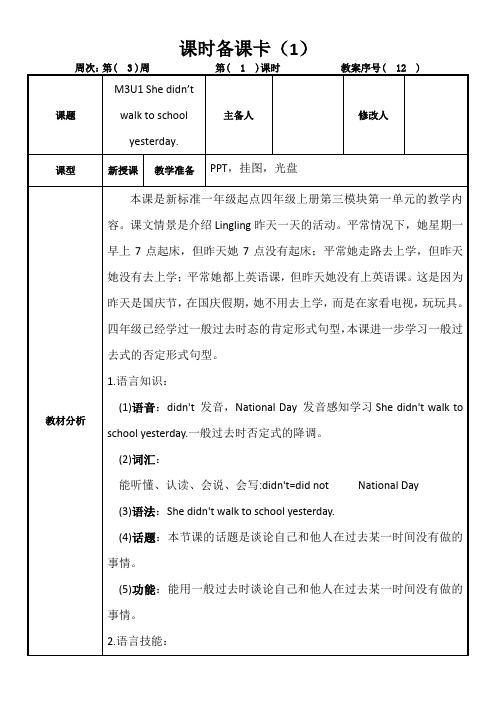M3U1单元
- 格式:ppt
- 大小:6.10 MB
- 文档页数:28

Book 3 Unit 1 Festivals around the world【Learning goals】学习目标1. Get familiar with the words and phrases in this unit.2. Master the basic use of important words, phrases and sentence structures .3. Learn to use the basic knowledge in this unit.一、课文回顾Complete the following passage with the help of the reading.There are all kinds of festivals or 1._________(celebrate) throughout the world, 2.________ are held to satisfy and please the ancestors, 3.________(honor) some famous people or important events, and to express people’s gratitude to the God for4.________(bring) them a year of harvest. For example, Japanese observe Obon, 5.________ people go to clean the graves and light incense 6.__________ memory of their ancestors. The Dragon Boat Festival in China honors the famous ancient poet Qu Yuan. In India, October 2 is a national festival to honor Mahatma Gandhi who helped India become an 7.__________(depend) country. China and Japan have mid-autumn festivals, when people admire the moon and in China, enjoy mooncakes. And in China the Spring Festival, which 8.________(celebrate) in January or February, is the most energetic and important because it is a festival that looks forward to the 9.________(begin) of spring. Why are all these festivals everywhere? Because during the festivals, people can get together to eat, drink and have fun with each other, 15.________(forget) all the daily struggle and demands for a while.1-5 celebrations; which; to honor; bringing; when; 6-10 in; independent; is celebrated; beginning; forgetting.二、本单元重点基础语言知识巩固Learn and keep in mind the use of the important words, phrases and sentences1.remind vt. 提醒;使想起常见搭配:remind sb. of sth./sb. 提醒某人(使某人想起)某事/某事remind sb. to do sth. 提醒某人做某事remind sb. that/how/what 提醒,,联想拓展: 常见的“vt. + sb. + of sth.”短语有:inform sb. of sth.通知某人某事convince sb. of sth.使某人相信某事accuse sb. of sth.指控某人某事cure sb. of sth.改正某人的不良行为cheat sb. of sth.骗取某人某物rob sb. of sth.抢劫某人某物考考你:完成句子(1). The mailboxes along the way __________ me __________ some of his stories. (2012浙江)(2). Reading fiction __________ me _________ there is life beyond my own.(3). After getting all the work done, we put up a board __________ people __________ protect the trees.(1)reminded; of (2)reminds; that (3) reminding; to2. forgive (forgave, forgiven) vt. & vi.宽恕;饶恕;原谅常见搭配:forgive sb. for (doing) sth.原谅某人(做了)某事forgive one’s doing sth.原谅某人做了某事forgive me请原谅;对不起forgive and forget不计前嫌e.g. It is a virtue to forgive and forget, especially in such a competitive and stressful society.(2012 江苏)不计前嫌是一种美德,尤其是在竞争如此激烈、压力如此沉重的社会中。





英语五年级上m3u1牛津笔记一、词汇与语法1. 生词1) apple 苹果2) banana 香蕉3) orange 橙子4) pear 梨5) watermelon 西瓜6) mango 芒果7) grape 葡萄8) strawberry 草莓2. 语法1) 一般现在时a. 表示经常性的动作或习惯b. 结构:主语 + 动词原形c. 例句:I eat an apple every day.2) 询问他人所拥有的事物a. 结构:Do you have ...?b. 例句:Do you have a banana?二、对话与交际1. 情景对话A: Do you have an orange?B: Yes, I do. Here you are.A: Thank you.2. 表达要求Can I have a mango, please?Sure, here you are.三、阅读与写作1. 阅读理解1) My favorite fruit is apple. I like to eat it every day. It is red and juicy. I also like to eat banana. It is yellow and tasty. What's your favorite fruit?2. 书面表达My favorite fruit is watermelon. It is big and sweet. I like to eat it in summer. What's your favorite fruit?四、听力与朗读1. 听力训练1) 听力材料:Listen and circle.A: Do you have a grape?B: No, I don’t.A: I have a grape. Here you are.2) 听力题目:What does A have?A) An appleB) A bananaC) A grape2. 朗读训练朗读短文"My favorite fruit is apple. I like to eat it every day."五、课后习题1. 选择题1) What's your favorite fruit?A) AppleB) BananaC) OrangeD) Watermelon答案:D2. 填空题1) I ____ an apple every day.答案:eat六、小结本单元主要学习了关于水果的词汇和一般现在时的用法。
教师学科教案[ 20 – 20 学年度第__学期]任教学科:_____________任教年级:_____________任教老师:_____________xx市实验学校Oxford English 2AModule 3 Unit 1 In the children’s gardenTopic: In the children’s gardenSub-topic:Period 1:Look and lear n﹠Look and sayPeriod 2:Ask and answer Listen and enjoy﹠ Learn the letters单元目标:一.知识目标:1.能够正确朗读单词slide, swing, seesaw。
2.能够运用特殊疑问句What can you see? What colour is it?进行提问并问答。
3.能够用句型I can see…来表达自己看到的事物。
二.能力目标1.通过pair work、看图问答等进行操练。
通过歌曲,对话,游戏等形式,用课文中提供的句型,让学生获取信息。
2.结合学生的能力,发挥他们的想象,模仿教师提供的儿歌编出不同的儿歌来。
3、通过多媒体让学生看看说说提高口头表达的能力。
三.情感目标:通过引导学生观察身边的生活环境,了解课外生活的美好,并且培养学生热爱大自然,享受大自然的情感。
单课时教学目标:单元文本设计:It’s a beautiful children’s garden.I can see a swing.It's orange.I can swing on the swing. It's very fun.I can see a slide.It's blue.I can slide on the slide. It's very fun.I can see a seesaw.It's red and yellow.I can play on the seesaw. It's very fun.教学过程设计:Period 1Period 2。
Module 3 HeroesUnit 1 She trained hard, so she became a great player later. 教学目标【知识能力目标】1. 能正确理解使用以下单词和词组:including medal attend abroad once again doctor degree whatever give up amazing will victory simply 等2. 能谈论自己喜欢的英雄人物,并可以与其他同学交流、介绍。
3. 学生主动了解世界各地英雄人物的相关信息,激发努力学习的高昂斗志。
教学重难点【教学重点】本单元重点单词、短语的用法【教学难点】能正确理解和运用because, so that, so 引导原因、目的、结果状语从句。
教学过程Step 1. Warming up教师可以问学生:In China,there is a famous woman table tennis player, she won Gold Medal of singles and doubles, 1992 & 1996 Olympic Games. And she is Reputed as the "Table Tennis Queen" and "Short Giantess". Do you know who she is and why she is famous?Give some pictures about Deng Yaping.Step 2. PresentationGive some pictures about new words, then let students remember them as quickly as possible.Step 3. ListeningFinish Activity 2 on page 18.Listen and choose the correct answer.Step 4. Reading1. Listen and answer the questions.1) Who is Daming’s hero?2) When did she start playing table tennis?3) How many gold medals has she won in the Olympics?2. Finish Activity 3 on page 19.Read and complete the table.Facts about Deng YapingWhen she was five, she ___________________.When she was twenty-four, she ________________.After she stopped playing, she began to _______ in Beijing.After seven yeas’ study abroad,she _______________.3. Read the conversation again and finish Activity 4 on page 19. (学生独立完成后,小组内交流答案。